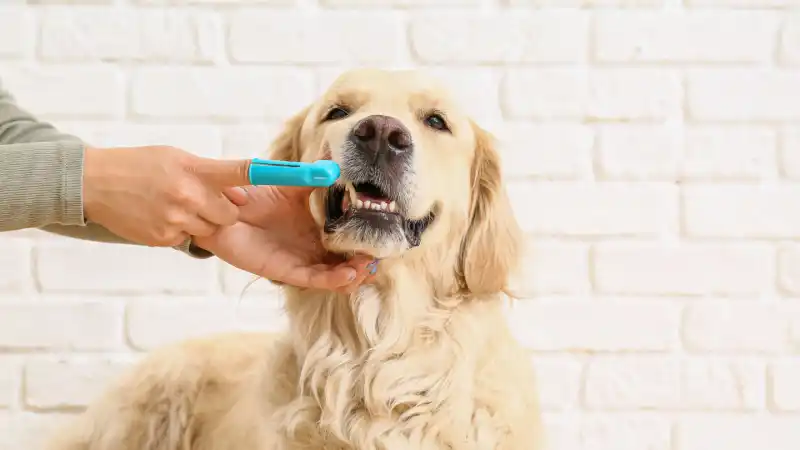Common Health Issues for Senior Pets
Even healthy pets suffer from health issues in their senior years. Here are 7 common conditions for senior cats and dogs, and how to combat them.

While no pet parent wants to think about their furry friend growing older, it's a natural part of every animal's life.
The age your pet is considered a senior will depend on their breed and size. Cats and small dog breeds are typically considered a senior at 7 years old, while larger dog breeds can be considered seniors at 5-6 years old.
While many pets live healthy, happy lives throughout their senior years, health issues are more likely as your pet ages. Read on to learn the most common health conditions and the signs to look for in your pet.
1. Obesity
Obesity is an increasingly common health condition in all pets, but most prominently in senior pets. In 2018, 55.8% of dogs and 59.5% of all cats in the United States were clinically overweight or obese – that's over 50 million dogs and 56 million cats.
Your pet's weight affects all aspects of their lives, and obesity can make them more susceptible to illness and more likely to develop diseases like heart disease and arthritis.
Because senior pets tend to be less active than young animals, they burn fewer calories throughout the day. Over time, these calories add up and they become overweight. Your pet is likely overweight if they:
Have fat around their rib and hip bones
Have no visible waistline
Have difficulty jumping or climbing
Seem lethargic or unwilling to move around
Have a messy, unkempt coat
2. Arthritis and Joint-Related Conditions
Osteoarthritisis common in both dogs and cats as they age, but especially large breeds.
This condition is an inflammation in the joints that progressively worsens as the joint cartilage deteriorates. When the cartilage is gone, there's no protective cushion to absorb the shock in your pet's joints, leading to pain and decreased range of motion.
Many of the symptoms are often overlooked as just normal aspects of a pet aging, but they should be taken seriously. Visit your vet if your pet experiences any of the following:
Stiffness, limping, or difficulty getting up
Lethargy
Weight gain
Irritability or changes in behavior
Loss of muscle mass over the limbs and spine
Reluctance to run, jump, climb stairs, or play normally
Difficulty squatting to use the bathroom
Accidents in the house

Every Dog and Cat Deserves the Pet Insurance of Champions
Get prize-winning care for your pets.
3. Kidney Disease
Chronic Kidney Disease (CKD)is common in senior cats, especially those 10 and older. CKD isn't a specific disease, but rather the end disease process of a variety of different conditions and diseases.
CKD can be caused by many things, including kidney stones and viral infections, but in most cases, the cause remains unknown. As your cat ages, their kidneys may no longer filter effectively, causing a buildup of waste products in the blood stream.
Kidney disease can also occur in senior dogs as their kidneys age and lose the ability to filter effectively.
Signs that your dog or cat could have kidney disease include:
Weight loss
Increased thirst and urination
Vomiting
Dehydration
Decreased appetite
Foul breath
Poor fur condition
Mouth sores
4. Heart Disease
Heart disease is almost as common in dogs as it is in people, with almost 75% of elderly dogs thought to have some form of heart disease. Cardiomyopathy is also commonly seen in senior cats.
Regardless of what type of heart disease your cat or dog starts with, it can develop into Congestive Heart Failure (CHF), a condition where the heart isn't able to pump blood efficiently, causing fluid to back up in the heart, lungs, and chest cavity.
The most common sign of CHF is coughing and difficulty breathing. Other signs include:
Reduced stamina
Lack of appetite
Weight loss
Unwillingness to exercise
Excessive panting
Swollen belly
Pale or bluish gums
5. Dental Disease
50-90% of cats older than 4 and over 80% of dogs over the age of 3 have some form of dental disease. The most common dental diseases include gingivitis and periodontitis, where plaque and tartar build up on the surface of the teeth, leading to inflammation in the gums.
Common signs of periodontal disease include:
Bleeding or inflamed gums
Discolored teeth
Loose or missing teeth
Bad breath
Weight loss
The good news about dental disease is that almost every case is preventable with good dental hygiene. Brush your pet's teeth regularly with pet-safe toothpaste, and take them to the vet every six months to have a professional cleaning.
6. Cognitive Dysfunction
Just like people, pets can experience a loss in cognitive function as they age, similar to symptoms of Alzheimer's. These symptoms can happen quickly or slowly over time, and depend largely on your pet and their health condition.
The main sign that your pet is experiencing cognitive dysfunction is a prolonged change in behavior, lasting longer than two weeks. Watch for:
Confusion
Increased sensitivity to sounds
Increased vocalization
Irritability, aggression, or anxiety
Accidents in the home
Lack of interest in playing
Excessive sleeping or changes in sleep cycle
While there's no cure for cognitive dysfunction, there are ways you can make life easier for your pet through exercise and daily mental stimulation.
7. Vision and Hearing Loss
As your pet ages, their senses can naturally deteriorate over time leading to vision or hearing loss. While other underlying medical conditions can lead to deterioration, it can also be part of your pet's natural aging process.
Signs that your pet's senses are declining include:
Less responsive to commands
Sleeping more soundly
Bumping into things
Becoming startled more easily
Changes in the appearance of one or both eyes
Avoiding stairs
Changes in behavior like anxiety or aggression
In most cases, hearing loss and vision loss related to aging aren't curable. But your pet can continue to live a happy life with a few adjustments to your interactions.
Dogs use their keen sense of smell to help them navigate the world, and you can make it easier by creating a safe environment for your pet inside your home.
Help Your Senior Pet Live a Long, Happy Life
While there are natural health issues that develop as your pet ages, there are many ways that you can help keep your pet happy and healthy during their senior years.
With good nutrition, plenty of exercise, and regular checkups with your vet, you can stay on top of your pet's health and make the necessary changes to keep them as comfortable as possible during their golden years.
Take some of the stress out of pet ownership with Accident & Illness Coverage through AKC Pet Insurance (underwritten by Independence American Insurance Company). Our pet insurance plans are designed to be there when you need them, allowing you to focus more on the health of your pet and less on costly veterinary bills.

Every Dog and Cat Deserves the Pet Insurance of Champions
Get prize-winning care for your pets.

Richard has shared his life with pets since childhood, and currently has a rescue cat and dog. He works with veterinarians and pet businesses to improve their content. To find out more, please visit his [website](https://richardrowlands.com/).
READ MORE ARTICLES

